MLC complaints data: 2017-2021
MLC complaints received
The MLC requires all vessels to have an onboard complaints procedure that provides seafarers with the opportunity to make complaints without concern or repercussion. The MLC also has provisions which gives rights to seafarers to make a complaint to the relevant flag or port State authorities when they believe that their living and/or working conditions on board are below standard.
In 2021, AMSA received 280 complaints8. AMSA received a higher number of complaints in 2020, which was double the number received in 2019. These complaints directly related to the consequences of the COVID-19 pandemic. However there has been a drop in complaints in 2021, as the industry and operators gradually adjusted to the pandemic, but it remains high in comparison to pre-COVID times.
AMSA received and processed a total of 1460 complaints since the implementation of the MLC (August 2013).
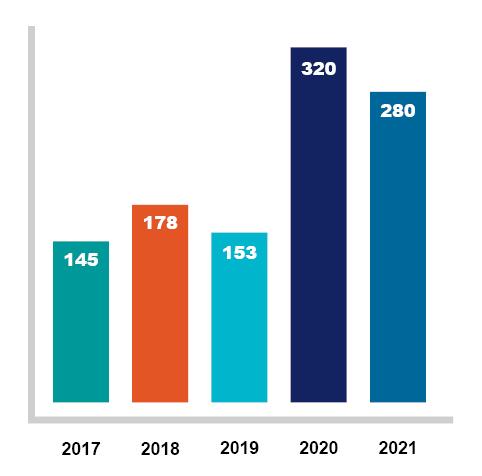
When complaints are received by AMSA, all necessary actions are taken to ensure the confidentiality of the complainant. Where appropriate, AMSA encourages resolution of complaints at shipboard level. If a complaint can’t be resolved, AMSA will investigate and can issue deficiencies and detain vessels. AMSA has also banned vessels from Australian ports for serious offences related to non-compliance with the MLC.
Follow up investigations of MLC complaints resulted in 52 vessels being issued with MLC-related deficiencies, seven of which were detained9. This represents a drop of 34 per cent in deficiencies issued and 56 per cent fewer vessel detentions compared to 2020.
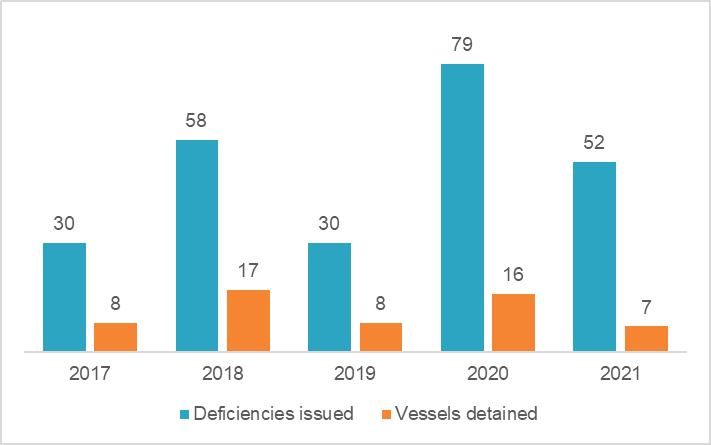
In 2021, 68.9 per cent of complaints received were from seafarers engaged on bulk carriers. This remains consistent over the past five years.
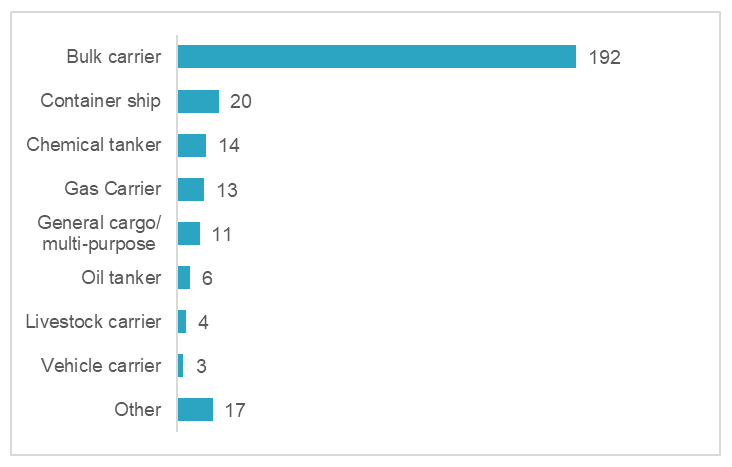
| Vessel type | 2017 | 2018 | 2019 | 2020 | 2021 |
|---|---|---|---|---|---|
| Bulk carrier | 95 | 117 | 88 | 224 | 192 |
| Chemical tanker | 4 | 5 | 2 | 9 | 14 |
| Container ship | 17 | 18 | 11 | 43 | 20 |
| Gas carrier | 2 | 0 | 6 | 12 | 13 |
| General cargo/multi-purpose | 7 | 4 | 3 | 7 | 11 |
| Livestock carrier | 5 | 9 | 4 | 4 | 4 |
| Oil tanker | 7 | 11 | 7 | 8 | 6 |
| Vehicle carrier | 1 | 3 | 4 | 3 | 3 |
Table 2 Breakdown of complaints by vessel type 2017-2021
Figure 4 shows a breakdown of 2021 complaints received by the Australian state or territory in which the vessel arrived. Western Australia (38.3 per cent) and Queensland (23.9 per cent) represent the highest number of complaints - noting also that Western Australia represents the majority (34.1 per cent) of vessel arrivals in Australia.

Complaints received by MLC titles
The main body of the MLC (the regulations and the code) is grouped into five main titles with data coded accordingly.
Title 1 – Minimum requirements for seafarers to work on vessels
Title 2 – Conditions of employment
Title 3 – Accommodation, recreational facilities, food and catering
Title 4 – Health Protection, medical care, welfare, and social security protection (including bullying and harassment)
Title 5 – Compliance and enforcement
The majority (60 per cent) of complaints were related to Title 2 of the MLC - Conditions of employment. This includes seafarer employment agreements, wages, hours of work and rest, entitlement to leave, repatriation, seafarer compensation, crewing levels and career development. Repatriation complaints resulting from the COVID-19 restrictions are captured under this title.
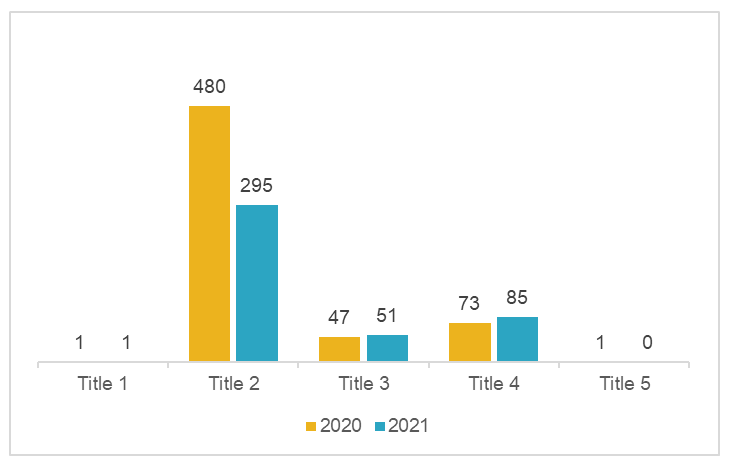
Title 2 has consistently had the highest number of complaints since 2017. There was a 26 per cent increase in Title 4 complaints from 2020 to 2021.
MLC Title | 2017 | 2018 | 2019 | 2020 | 2021 |
Title 1 Minimum requirements | 2 | 1 | 3 | 1 | 1 |
Title 2 Conditions of employment | 108 | 157 | 108 | 480 | 295 |
Title 3 Accommodation, recreational facilities, food and catering | 35 | 61 | 55 | 73 | 85 |
Title 4 Health protection, medical care, welfare, social security protection | 35 | 61 | 55 | 73 | 85 |
Title 5 Compliance and enforcement | 1 | 7 | 1 | 1 | 0 |
Table 3 MLC complaints breakdown by title 2017-2021
Conditions of employment (Title 2)
In 2021, there was a significant drop in Title 2 complaints in comparison with 2020. This is an indication that AMSA’s response to repatriation complaints is working.
Of Title 2 complaints, the highest number of complaints received related to repatriation and seafarer employment agreements (35.6 per cent and 28.5 per cent respectively). This is likely due to the ongoing challenges faced by seafarers during the COVID-19 pandemic regarding the time served onboard and the difficulties faced with repatriation. Wages have consistently made up the majority of complaints from 2017-2020 with the number of wage complaints remaining high in 2021.
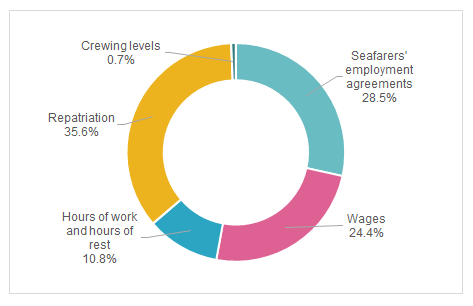
AMSA's response to the COVID-19 pandemic repatriation challenges faced by seafarers
Under the MLC, the maximum period that a seafarer can serve aboard a vessel without leave is 11 months. Seafarers have shouldered a heavy burden during the COVID-19 pandemic to maintain global trade and keep our economies moving by delivering vital supplies. However, this has come at great personal cost to seafarers who have spent longer periods onboard ships than that prescribed by the regulations, unable to take shore leave due to mandatory quarantine requirements or border closures, separated from their friends and families. Sufficient time has now passed for operators to adjust to the COVID-19 world and develop new plans for seafarer repatriation and crew changes, so AMSA has reverted to enforcing maximum period on board as per Marine Notice 17/2016 Maximum period of shipboard service for seafarers.
Between July 2020 and December 2021, the number of complaints related to repatriation declined significantly, which is a clear indication that AMSA’s approach of getting seafarers home to their loved ones for respite, improved the welfare of those serving at sea.
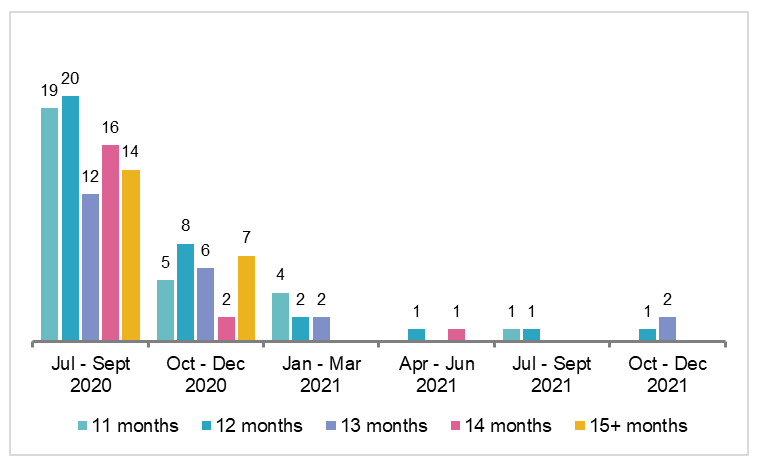
Complaints follow-up
AMSA endeavours to investigate all MLC complaints—and has done so—except in cases where the vessel was out of area and has not arrived in Australia. In those situations, AMSA places alerts on the vessel to ensure the complaint is investigated when the vessel next arrives in Australia and may refer the complaint to the flag State of the vessel or port State of the vessel’s next arrival. In all cases we try to ensure the confidentiality of the complainant will be maintained.
Figure 8 provides a breakdown of follow up actions undertaken with 38.3 per cent of complaints unsubstantiated.
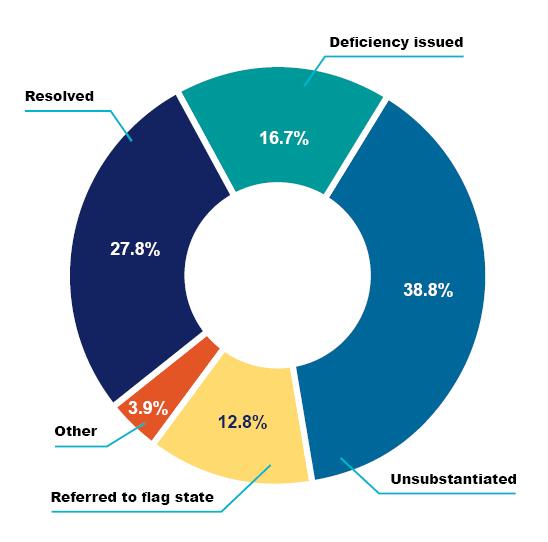
Figure 9 shows the distribution of complaints received from foreign flagged vessels by flag State for 2021 compared to the distribution of complaints when the number of port arrivals has been taken into consideration11.
The flag states in Figure 9 accounted for 94.5% of foreign flagged port arrivals and 88.6% of complaints received from foreign flagged vessels in 2021.
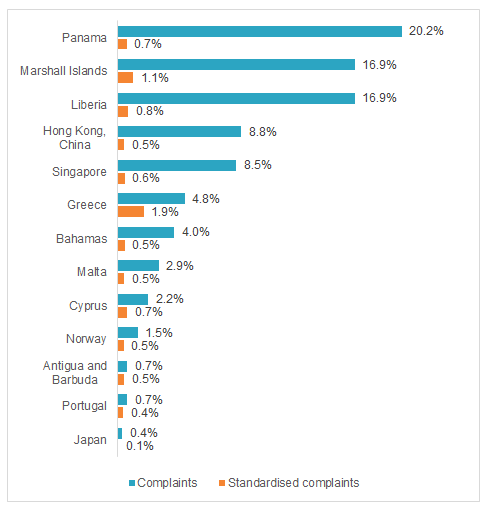
The number of complaints originating directly from seafarers has increased across the years, reaching 60 per cent in 2021.
Source | 2017 | 2018 | 2019 | 2020 | 2021 |
Seafarer | 44 | 75 | 70 | 180 | 171 |
ITF | 43 | 39 | 43 | 92 | 54 |
Welfare group | 32 | 31 | 14 | 13 | 9 |
Government agency | 10 | 9 | 9 | 4 | 10 |
Other | 17 | 24 | 17 | 31 | 36 |
Table 4 Source of complaints 2017-2021
This is likely an indication of the increased awareness of seafarers’ rights under the MLC and the knowledge that Australia takes seafarer welfare seriously. Seafarers are therefore more confident that their concerns are taken seriously and treated confidentially when in Australia.
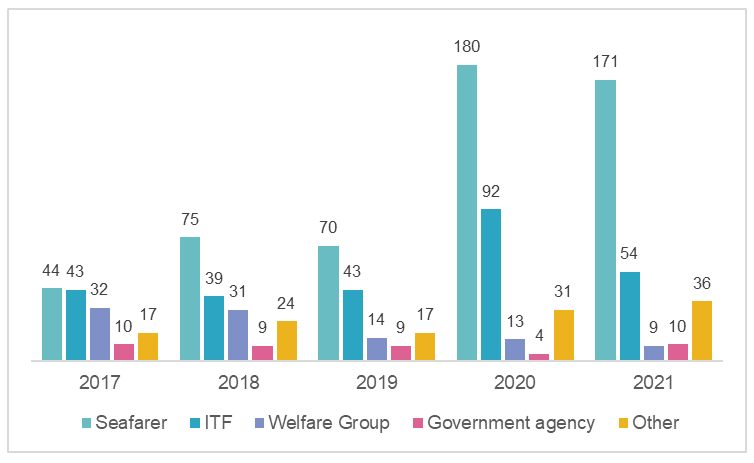
AMSA has a zero-tolerance approach to breaches under the MLC. Since 2017, a total of 19 vessels have been issued a direction notice under the Navigation Act 2012 refusing them access to Australian ports. Of those 19 vessels, 15 (79%) were banned for serious breaches in relation to MLC for reasons that primarily include underpayment of wages and decent working and living conditions.
In 2021, three vessels were banned from Australian ports due to MLC breaches. The reasons for the bans range from underpayment of wages, poor working and living conditions, inadequate provisions, inadequate hours of work and rest and falsified records of work and rest. These were banned for a period of six to thirty-six months. An estimated total amount of AUD $175,000 in wages was recovered from vessels in 2021.
Footnotes
8 The 2021 data includes seven complaints received from seven Registered Australian Vessel (RAV). The complaints received were under MLC Title 2: Conditions of employment and MLC Title 4: Health protection, medical care, welfare, social security protection. All complaints were resolved with no deficiencies issued.
9 One vessel was detained during a follow-up inspection for deficiencies other than MLC.
10 In some cases more than one regulation has been detailed in a single complaint.
11 Standardising the data provides a better reflection of the reporting rate of vessels from different flag states.